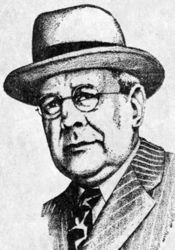Robert Ingalls: Difference between revisions
mNo edit summary |
mNo edit summary |
||
| Line 1: | Line 1: | ||
[[Image:Ingallssr.jpg|right|thumb|175px|Robert Ingersoll Ingalls, Sr]] | [[Image:Ingallssr.jpg|right|thumb|175px|Robert Ingersoll Ingalls, Sr]] | ||
Robert Ingersoll Ingalls, Sr. was born in Logan County, Ohio | Robert Ingersoll Ingalls, Sr. was born in Logan County, Ohio on October 27, 1882. He graduated from Bellefontaine High School in 1898, attended Ohio Northern and spent 10 years as an accountant. | ||
In 1910, he left Dayton, Ohio at age 28 and bought half-interest in a small machine shop in Birmingham, Alabama for $5,000. The company produced ornamental iron and steel grating, fire escapes, and stairways. Ingalls purchased remaining interest in the shop in 1911 and founded The Ingalls Iron Works Company. It's said he was fond of telling people he started with “one mule, a busted crane and the 26th Street viaduct for a roof." | In 1910, he left Dayton, Ohio at age 28 and bought half-interest in a small machine shop in Birmingham, Alabama for $5,000. The company produced ornamental iron and steel grating, fire escapes, and stairways. Ingalls purchased remaining interest in the shop in 1911 and founded The Ingalls Iron Works Company. It's said he was fond of telling people he started with “one mule, a busted crane and the 26th Street viaduct for a roof." | ||
| Line 9: | Line 9: | ||
In 1939, Ingalls opened a shipyard at Pascagoula, Mississippi. When World War II broke out he was awarded $250 million in contracts. | In 1939, Ingalls opened a shipyard at Pascagoula, Mississippi. When World War II broke out he was awarded $250 million in contracts. | ||
Ingalls was said to be extremely cost-conscious to the point of | Ingalls was said to be extremely cost-conscious to the point of picking up stray nuts and bolts and turning off lights in the plant after hours. | ||
In 1951, Ingalls suffered a stroke. After a two-week battle, he died at age 68. He left behind the fourth largest shipyard and one of the country’s biggest independent steel companies. That year, the combined Ingalls Industries grossed more than $200 million. | In 1951, Ingalls suffered a stroke. After a two-week battle, he died at age 68 on July 12, 1951. He left behind the fourth largest shipyard and one of the country’s biggest independent steel companies. That year, the combined Ingalls Industries grossed more than $200 million. | ||
==References== | ==References== | ||
* Mary Ellen Lynch "Ingalls Started Empire Making Iron Love Seats." ''The Dayton Daily News'', Tuesday, March 21, 1961. | * Mary Ellen Lynch "Ingalls Started Empire Making Iron Love Seats." ''The Dayton Daily News'', Tuesday, March 21, 1961. | ||
* World War I Draft Registration Cards, 1917-1918, Roll 1509352 | |||
* ''The Ingalls Companies: Steel, Skill and Service'', 1978 | |||
Revision as of 22:36, 24 April 2007
Robert Ingersoll Ingalls, Sr. was born in Logan County, Ohio on October 27, 1882. He graduated from Bellefontaine High School in 1898, attended Ohio Northern and spent 10 years as an accountant.
In 1910, he left Dayton, Ohio at age 28 and bought half-interest in a small machine shop in Birmingham, Alabama for $5,000. The company produced ornamental iron and steel grating, fire escapes, and stairways. Ingalls purchased remaining interest in the shop in 1911 and founded The Ingalls Iron Works Company. It's said he was fond of telling people he started with “one mule, a busted crane and the 26th Street viaduct for a roof."
Within three years, his company had grown to employ 45 people. He built a small plant in the Titusville community in 1914 which grew to become the base for a nationally-known iron and steel fabrication company.
In 1939, Ingalls opened a shipyard at Pascagoula, Mississippi. When World War II broke out he was awarded $250 million in contracts.
Ingalls was said to be extremely cost-conscious to the point of picking up stray nuts and bolts and turning off lights in the plant after hours.
In 1951, Ingalls suffered a stroke. After a two-week battle, he died at age 68 on July 12, 1951. He left behind the fourth largest shipyard and one of the country’s biggest independent steel companies. That year, the combined Ingalls Industries grossed more than $200 million.
References
- Mary Ellen Lynch "Ingalls Started Empire Making Iron Love Seats." The Dayton Daily News, Tuesday, March 21, 1961.
- World War I Draft Registration Cards, 1917-1918, Roll 1509352
- The Ingalls Companies: Steel, Skill and Service, 1978
